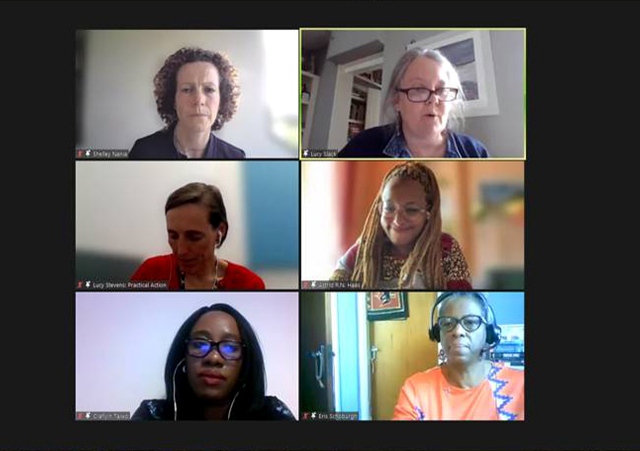 Panellists [top left clockwise]: Shelly Nania, Lucy Slack, Astrid Haas, Eris Shoburgh, Olafiyin Taiwo and Lucy Stevens.
Panellists [top left clockwise]: Shelly Nania, Lucy Slack, Astrid Haas, Eris Shoburgh, Olafiyin Taiwo and Lucy Stevens.
There’s been a growing focus in articles and Commonwealth meetings on the importance of civil society, local government and communities working on the ground in forging new paths in the post-pandemic world.
In line with this theme, a 26 April event, entitled the Call to Action on Sustainable Urbanisation across the Commonwealth, explored the role of local government, Commonwealth organisations, NGOs and universities to deliver ways to build more sustainable urban spaces in Commonwealth countries.
This latest event is one in a series of consultations organised by the Association of Commonwealth Universities (ACU), the Commonwealth Association of Planners, the Commonwealth Association Architects (CAA) and the Commonwealth Local Government Forum (CLGF), in collaboration with the Rwandan Government and the Prince’s Foundation.
These organisations had pulled together a blueprint Call to Action in 2020. This webinar took place in the countdown to the Commonwealth Heads of Government Meeting (CHOGM) in Rwanda in June and ahead of a 28 April United Nations High-Level Meeting on the Implementation of the New Urban Agenda.
CLGF Chair, Rev Mpho MW Moruakgomo, said that climate change and the Covid pandemic had exacerbated existing trends in income and power disparities, indicating the need for new ways to build urban spaces. He said that the current campaign responded to the UN’s Agenda 2030 on urban development and the new urban agenda. “We need cities and towns that work and can deliver for citizens,” he said.
Head of Rwanda’s Housing, Urban Planning and Development Division and Rwanda Housing Authority, Edward Kyazze, said that sustainable urbanisation would be a “defining issue for the Commonwealth” when his country takes over the chair of the organisation.
“Urbanisation is an unstoppable mega train,” UN Habitat’s Chief of Staff Neil Khor said, adding that this work had “the potential for managing urbanisation and becoming a powerful tool of sustainable development”.
Commonwealth effectiveness
Panellists spoke of the need for a co-ordinated approach and mobilising the Commonwealth network to provide ways to build new cities which could stand up to climate change and future pandemics.
The CAA’s Peter Oborn said that rapid but “poorly planned urbanisation” in Commonwealth countries had created inequality and vulnerability. He said that this could be tackled by using the Commonwealth’s ability of “sharing of collective knowledge effectively”. “The Commonwealth provides the perfect eco system in which to do this,” he said.
ACU’s Joanna Newman outlined the role of Commonwealth universities – with their range of expertise from small island states to mega cities – in sharing best practice. “International partnerships will be vital,” she said in a recorded message.
A side event at the upcoming CHOGM will focus on the issue of sustainable development.
On the ground knowledge
The panel session brought together CLGF Secretary General Lucy Slack, Bristol Mayor Marvin Rees, Uganda-based urban economist Astrid Haas, Eris Schoburgh of the University of the West Indies (UWI), Chair of the Commonwealth Association of Planners Young Planners Network and Co-Chair of the UN Habitat Planners for Climate Action Initiative, Olafiyin Taiwo, Lucy Stevens of Practical Action and Bristol’s Shelley Nania.
Olafiyin Taiwo, who is also a Commonwealth Sustainable Cities Network member and town planner, said that the professional network had been set up to include young people in the discussion.
All the panellists emphasised the work already taking place by people closest to life in cities. In a recorded message, Mayor Rees said that urban planning policy making should not wait on national policies but should work through cities at the “cutting edge” of urban challenges.
Shelley Nania, also from Bristol, said that national governments could not deliver at the necessary pace.
Astrid Haas said that “finance needs to flow to cities but they must be the right projects”, based on the needs of people living in cities. She added that such projects reflected what citizens really needed.
UWI’s Eris Schoburgh said that universities had a role in providing skills, research and evidence-based data to support policy planning, sustainable procedures and effective land use.
During the Q&A session, panellists discussed the need to allow cities to borrow, the importance of updating old city planning legislation and the importance of action at a local level.
Panel chair, Lucy Stevens, described it as putting community voices centre stage.
Panellists looked at the role of informal sectors providing the core services for cities. They discussed the need for small and medium enterprise policies to support informal businesses and settlements which are so much a part of Commonwealth cities.
With cities being planned and built at rapid speed in most parts of the Commonwealth, participants summed up the need to take the financing and the urban policy planning directly to local communities with the research support of Commonwealth architects, planners and universities.
“We can’t do things as we’ve always done them,” said Lucy Slack.
“We don’t get this opportunity again as we build new Commonwealth cities,” said Astrid Haas.
Debbie Ransome is the Website Editor for the Round Table website.
Related links
Commonwealth Sustainable Development Initiative
The UN Habitat Professionals Forum roadmap to recovery background report
Commonwealth Youth for sustainable urbanisation
CLGF continuing campaign on sustainable urbanisation



